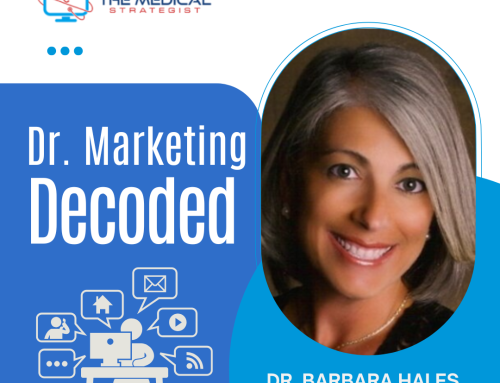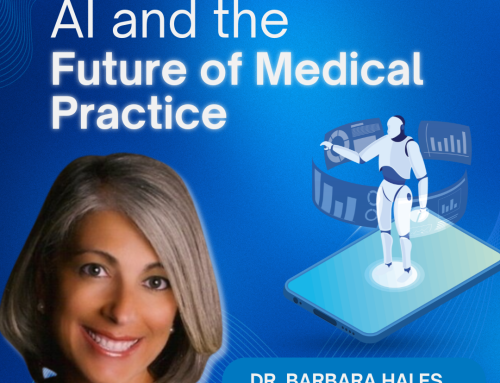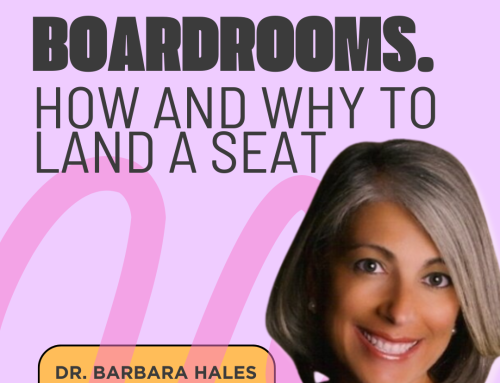Podcast: Play in new window | Download
Subscribe: RSS
In this episode, Barbara Hales and Nick Nanton discuss:
- How DNA takes clients from being unknown to celebrity status within their industry
- How to obtain credentials and credulity to help people understand their clients are the trusted expert
- Steps to becoming a media authority and considered a more credible expert from others in the same field
Key Takeaways:
- “Celebrity” is being a thought leader, being a respected person in your industry that everyone else looks to
- Having celebrity status helps avoid the conversation trying to convince someone you are the right person to work with
- To the layperson looking for someone to help them, all professional look the same. Being set apart is critical to building credibility and be recognized as an expert in one’s field.
“Most human beings are pretty humble. You’ve been through your life experiences, so they’re not as interesting you. But other people are fascinated to learn about who you are and where you came from. What they’re looking for is what do they have in common with you because trust is built with commonalities.” — Nick Nanton
Transcription
003 Nick Nanton
What is takes to Obtain Celebrity Status
Barbara Hales: Hi, this is Barbara Hales interviewing Nick Nanton. Starting out as a nurse and attorney, Nick Nanton has become an Emmy award-winning director and celebrity agent. His branding agency DNA has an impressive track record and he’s able to turn his clients into celebrities. We are extremely fortunate to have him here today. So, tell me Nick, how did this all get started for you?
Nick Nanton: This all started in the music business. I started playing guitar at six, I started songwriting at 16, put out my first record at 18, of which there’s still about 800 copies under my parents’ bed because I didn’t know anything about marketing at the time. And now that I do know about marketing, I know I want them to stay there. But I wanted to make a career in the music business and I didn’t have an uncle in the business, a friend in the business. I really had to start figuring out creative ways to get in the conversation as a kid in that business. And then over time, my mentor Jack, who you’ve met, we were doing music business and stuff together and he [inaudible 00:01:05] bands and musicians might even have more impact in the business world. And we created the agency to represent business people just like we represented musicians. So that’s the short story, but that’s essentially how I got into it.
Barbara Hales: That’s great. So, it’s obvious that being a celebrity is going to get you further in your business and way ahead of your competition. How do you do that for people?
Nick Nanton: I think it is certainly… A celebrity’s one way to put it, but I think being a thought leader, being a respected person in your industry that everyone else looks to just helps. It avoids that part of the conversation where you’re trying to convince people that you’re the one they should work with, that you’re the right guy to work with, you’re the right woman to work with. It just starts the conversation with, Hey, I know you’re the right one to help me. How can we work together? And I know much like you, I much prefer to start in that portion of the conversation then spending 20 minutes or 30 minutes or whatever it is, trying to convince somebody that you’re the right person to work with because it’s hard to do, especially one-on-one. It seems like where so many people start out in their businesses and there’s just a much easier way.
The way we do it for our clients is we help them get third party credentials and credibility that help people understand that they are the trusted expert, they are the thought leader in the industry. We do that with things like making them best-selling authors, sometimes by themselves, sometimes partnering up with other icons like Brian Tracy and Jack Canfield and other business and celebrity icons. We get them on TV shows that we are on NBC and ABC and CBS and Fox. We get them in major newspapers and magazines. We get them all over the place. There’s different ways of doing it, but we choose to use third party credibility and credentials that the marketplace already identifies with. And I think that it works really well.
Barbara Hales: So, tell me something, Nick, can professionals use your getting people to be celebrities?
Nick Nanton: Absolutely. And I want to say I want to acknowledge him. It’s kind of funny. I’m in a car right now. I am on the road, but I wanted to make sure we got this interview in. But there’s a couple of important things when it comes to professionals. So being an attorney myself, I’ve worked in the professional field, I work with thousands of professionals all around the globe. And one of the things I think that we get sold into the idea of, and by the way, when I say professional, I mean doctor or lawyer, but also financial advisors, personal trainers, anyone who goes through the process of being certified. They have to cross a barrier, a threshold, they have to pass a bar, a board, a certification test, go through a course. A real estate agent, they’ve got to pass a test.
We’re sold the idea on the way in that all we need to do is do this and then we can start practicing or we can start helping people. And that is true. But what we forget is everyone on the other… These are barriers to entry and they’re in place for a reason, most of them. So the good news is now, yes, once we cross that threshold, we can in fact be certified or licensed to help somebody. And there’s a lot of people in the world who aren’t certified or licensed, so they can’t do it. But to the lay person looking for someone to help them, everyone looks the same because the lowest bar of entry is passing a bar, passing boards, getting certified. So in order to set ourselves apart, we have to do other things to set ourselves apart from the rest of the crowd.
Because I don’t know about you, but if I go to pick a brain surgeon, I don’t know who to pick. I could get a referral, I could get… But if I walk in a one brain surgeon’s office and his office is like most physicians I know and you probably know too, kind of outdated, built in the 80s or the 90s in the heyday of the medical profession. It has some diplomas here and there. Okay, but if I’m go to get a second opinion or I go to another doctor and there’s interviews running on the TV and a sizzle reel of the recent interviews on TV, on NBC or ABC or CBS or Fox and there are best-selling books on brain surgery, medicine and success in life and how to recover after brain surgery, are all framed on the walls and they’d been in Inc. magazine and USA Today and Wall Street… Those are framed on their walls.
Okay, now I know I’m dealing with someone on a whole different level because they’re a trusted media authority. So, they must be doing something different. I am now instantly going to recognize them and think that they have something very different to offer. They must be a more credible expert than the other doctor I went to. Now, of course, perception is reality and you have to be able to deliver the results. We can create amazing credibility and credentials for our clients all day long, but if they’re not doing a good job for their clients or patients, then it’ll all crumble anyway. I want to put that out there, but you got to cross over that threshold and then you start climbing what I call the ladder of credibility. The first rung on the ladder is that professional certification or license. Then you’ve got to go up and up and up from there. So, you’re the most recognized in the marketplace.
Barbara Hales: That sounds really exciting. Tell me, if a professional comes to you and says, “I don’t really know what to speak about that is going to stand out from everybody else. I don’t really have a unique selling proposition.” Do you help them formulate that?
Nick Nanton: We absolutely do and it’s really funny because all of us… I think it a good thing. Most human beings are pretty humble. And also you’ve been through your life experiences so they’re not as interesting to you, but other people are fascinated to learn about who you are and where you came from. And really what they’re looking for is what do they have in common with you, because trust is built with commonalities. If we both love a certain singer or a certain poet or a certain movie, or we practice a similar faith or similar set of ideals or we have a family, we trust each other more because we have more in common. If you’re like me, you must be a good person because I’m a good person. That’s how we think.
We do that when we help people work through their origin stories. We even go to the level of helping clients do things like… I’ll give a simple example of, let’s say, a bariatric surgeon. Many of us have things that we… We can help a client get started, we can do things for them, but ultimately, they have to make a continuing level of good choices after they work with us. One thing we do like, let’s say a bariatric surgeon, they obviously need their clients to make good life choices after they do the bariatric surgery. They want to lose weight, let’s say. One of the things we do is we work with a client, figure out what’s a great message. And so let’s just say their big theme is they help their clients achieve new beginnings or a healthy new start. We’ll actually commission an artist to create a piece of artwork that represents that. We’ll make it huge and blow it up and put it on canvas in their office and they make that a piece of their consult room or a big piece of their entryway.
And people walk in, and they sit down for the consultation. They’ll use it in their presentation to say, “Hey, did you notice the artwork?” And people say, “Of course, I couldn’t miss it.” Say, well that actually represents new beginnings. We had this commissioned because it’s what we want to represent to our clients and patients. And actually, when you become a patient of ours, I’m going to send you a copy to hang in your home so that every day you wake up, every day you start your day, you can see that same message and be reminded of the new beginning you’re being given. And it can help you make good choices. Now that’s just one simple example, but we help people craft their communication strategy, their media, their marketing from the ground up. Whatever they need, we can help with it. We have a lot of group programs or do individual consulting, all sorts of things. And we love doing it because we know media, and the right messaging can help you help a lot more people.
Barbara Hales: I’m sure that my listeners are really excited about that. How can they reach you to enroll in some of your programs?
Nick Nanton: Absolutely. I appreciate that. They can visit celebritybrandingagency.com and opt in there. You can get free copies of our books and other cool things and if you want to send an email you can email info@celebritybrandingagency.com. We’d be glad to connect to you. We’d love to help and I certainly appreciate working with you over the years, Dr. Barbara, and thanks for having me on the show.
Barbara Hales: Thank you so much.
Connect with Nick Nanton:
Twitter: @nicknanton
Facebook: @nicknanton
Website: www.celebritybrandingagency.com
Email: info@celebritybrandingagency.com
YouTube: nicnnantonesq
LinkedIn: Nick Nanton
Connect with Barbara Hales:
Twitter: @DrBarbaraHales
Facebook: www.facebook.com/theMedicalStrategist
Business website:http://www.TheMedicalStrategist.com
Show website: MarketingTipsForDoctors.com
Email: Barbara@TheMedicalStrategist
Book: all on Amazon
- Content Copy Made Easy
- 14 Tactics to Triple Sales
- Power to the Patient: The Medical Strategist
YouTube: TheMedicalStrategist
LinkedIn: www.linkedin.com/in/barbarahales



